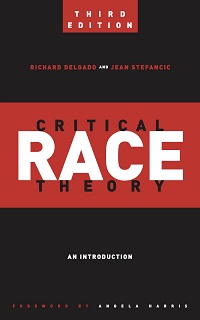Critical Race Theory
Is Critical Race Theory Being Taught in K-12?
The biggest push back against those that are against CRT being used in our K-12 classrooms is the claim that CRT is not being taught in our schools.
That CRT is just a graduate level law class taught at some univeristies. This is actually true. You will not see CRT mentioned directly in classroom lessons.
What you do see is lessons influenced by CRT. In essence when we talk about CRT in schools, we are not talking about the theory being directly taught, but rather
that thheory put into practice.

|
|
In their book "Critical Race Theory, An Introduction,"
Richard Delgado and Jean Stefancic define CRT on page 3 as follows:
"The critical race theory (CRT) movement is a collection of activists, and scholoars engaged in studying and transforming the relationship among race, racism, and power.
The movement considers many of the same issues that conventional civil rights and enthnic studies discourses take up but places them in a broader perspective that includes
economics, history, setting, group and self-interest, and emotions and the unconcious. Unlike traditional civil rights discourse, which stresses incrementalism
and step-by-step progress, critical race theory questions the very foundation of the liberal order, including equality theory, legal reasoning, Enlightenment rationalism,
and neutral principals of constitutional law."
On page 8 we learn:
"...critical race theory contains an activist dimension. It tries not only to understand our social situation but to change it..."
|
It is this activist dimension that is the source of CRT influencing our school curricula.
Critical Race Theory in Education
Critical Race Theory in Education is discussed on page 7 of "Critical Race Theory and Introduction" under the heading "Spin-Off Movements":
"Altought CRT began as a movement in the law, it has rapidlty spread beyond that disciplne. Today, many scholars in the field of education consider themselves critical race
theorists who use CRT's ideas to understand issues of school discipline and hierarchy, tracking, affirmative action, high-stakes testing, controversies over curriculum
and history, bilingual and multicultural education, and alternative and charter schools. (See, e.g.,
Foundations of Critical Race Theory in Education
[Edward Taylor, David Gillborn & Gloria Ladson-Billings eds., 2d ed. 2015].)
The earlies mention of CRT in education comes from the 1995 paper
"Toward a Critical Race Theory of Education"
co-authored by
Gloria Ladson Billings
and William F. Tate IV. Some excerpts from that work:
Marxist and Neo-Marxist formulations about class continue to merit consideration as theoretical models for understanding social inequity."
Many discussions of democracy conflate it with capitalism despite the fact that it is possible to have a democratic government with an economic system other than
capitalism…Traditional civil rights approaches to solving inequality have depended on the “rightness” of democracy while ignoring the structural inequality of capitalism.”
The latter quote certainly sounds like promoting "Democratic Socialism" favored by the likes of Bernie Sanders, Alexandria Ocasio-Cortez, and their cohorts. This should come as
no surprise given CRT was created by, in Richard Delgado's own words, "a bunch of Marxists" (see below).
Origins of CRT
Critical Race Theory came to be at a conference held at the University of Wisconsin in 1989. On the 20th anniversarry of that meeting Richard Delgado and
Jean Stefancic were interviewed about the founding of the movement.
"DELGADO: I was a member of the founding conference. Two dozen of us gathered in Madison, Wisconsin to see what we had in common and whether
we could plan a joint action in the future, whether we had a scholarly agenda we could share, and perhaps a name for the organization. I had taught at the
University of Wisconsin, and Kim Crenshaw later joined the faculty as well. The school seemed a logical site for it because of the Institute for Legal
Studies that David Trubek was running at that time and because of the Hastie Fellowship program. The school was a center of left academic legal
thought. So we gathered at that convent for two and a half days, around a table in an austere room with stained glass windows and crucifixes here and
there-an odd place for a bunch of Marxists-and worked out a set of principles. Then we went our separate ways. Most of us who were there have
gone on to become prominent critical race theorists, including Kim Crenshaw, who spoke at the Iowa conference, as well as Mani Matsuda and Charles
Lawrence, who both are here in spirit. Derrick Bell, who was doing critical race theory long before it had a name, was at the Madison workshop and has
been something of an intellectual godfather for the movement. So we were off and running."
"STEFANCIC: In the mid 1990s, educators began to hear about critical race theory...African American, Latino, and other minority graduate students who planned
to go out into the community and become teachers and reform schools began to find each other in their field, just as the critical race theory and law people
found each other there earlier."
"DELGADO: Seeing critical race theory take off in education has been a
source of great satisfaction for the two of us. Critical race theory is in some ways livelier in education right now than it is in law,
where it is a mature movement that has settled down by comparison."
The full interview is available here:
Living History Interview with Richard Delgado & Jean Stefancic
One has to wonder, if neither CRT nor lessons based in CRT are being taught in K-12 schools, why the Massachusetts Democrats passed a resolution at their 2022 Convention that states
"the members of the Massachusetts Democratic Party (MDP), denounce the proposal or establishment of laws, policies, and procedures that prohibit the instruction and/or discussion of Critical Race Theory"?
Massachusetts
Democratic Party Passes Resolution ‘Acknowledging The Value Of’ Critical Race Theory In Schools
Convention Resolutions 2022